New Delhi, April 13, 2024: For the purpose of giving its members a guaranteed market for their milk, Poolani Milk Cooperative Society [PMCS] undertook a number of activities and has a highly promising future. Currently, conditions are excellent for both the welfare of animals and the success of dairy producers. Dairy farming has become the primary source of revenue among farmers of Meloor panchayat. It had 30 members when it was officially registered in 1976 under the Co-operative Societies Act of 1912. It has 1368 members and can handle 2250 litres of milk per day as of 2012. The initiative has successfully integrated improved technology and management into the conventional small milk producer production system, making significant improvements to animal husbandry at Meloor Village. In the hamlet, it directly and indirectly supports 2000 employments, and it gives its members about Rs 25 lakhs each month.Additionally, PMCS are certified to ISO 9001:2015 and ISO 2200:2005.
All members of PMCS are required to maintain the quality of milk and milk products in accordance with the standards of the Kerala Co-operative Milk Marketing Federation (KCMMF), also known as Milma, and the National Dairy Development Board [NDDB]. PMCS has one main centre with a chilling plant at Poolani and two sub centres at Adichili and Pusphagari. The board is always concerned with customer concerns about quality issues and offers milk farmers a competitive milk market and technological assistance to increase milk output.
To prevent adulteration of flour, urea, and detergent with water. sustaining their inherent nutritional content is crucial for sustaining the quality. Since milk and milk products are consumed by many social groups and are the primary source of calcium and protein may be found in milk. In addition to these, it is a fantastic source of vitamins, minerals, potassium, B12, and omega 3 fatty acids., it has been difficult to screen for and approve non-adulterated milk and milk products.Members delivered the milk to the appropriate centres, where it was subjected to normal quality inspection procedures. Utilising the MILKO Tester and an automated milk collecting unit (AMCU), the quality measurement is carried out scientifically. The MILKO Tester aids in the quick determination of the milk’s fat percentage, and the AMCU shortens farmers’ waiting times and eliminates unfair practises. Installed Automatic Milk Chilling Plant, Capacity: 2000 litters at centre and applied for 5000 litters. By the conclusion of every 10 days, the cashier settles the account and transfers into shareholders account after inputting the milk measurement twice every day. Camp and monthly meetings were organised to enhance cattle, and participants included farmers, veterinarians, livestock specialists, and government officials. To increase livestock output and productivity in the village, veterinarians perform regular checkups and offer high-quality animal health services, including technological input services such animal health care, artificial insemination services, immunisation, and the provision of balanced cow feed.
Meloor produces enough milk on its own. According to instructions from KCMMF and NDDB, PMCS assists farmers in price negotiations and the assembly or marketing of milk and dairy products to wholesalers and retailers. The sector plays a crucial role in achieving food security, reducing village poverty, generating employment opportunities for women, and providing a regular source of income. It also promotes sustainable agriculture practices and contributes to the overall economic development of rural areas.
Equal pay for men and women is guaranteed. By providing jobs for women, PMCS has significantly contributed to the economic empowerment of women and laid the foundation for increased independence and self-esteem.
Women’s ability to manage an independent income and education is made possible by their ability to work. The idea that if one woman is educated, the entire family is educated and if the family is educated, the entire society is educated is valid in a bigger context. The establishment of PMCS also aids in raising milk prices, resulting in higher rural incomes, lowering waste, ensuring value addition, and creating job possibilities.
Every five year, elections are held to choose the director board members, and the president is chosen by the nine members that make up the membership. The president and the elected members are present during every ordinary meeting. The reports must be delivered to NDDB and Milma. The administrative team arranges a number of social programs, including pensions and subsidies for livestock feed, among others.The President, Shri N G Sathish Kumar, and Secretary, Smt. P PJalaga and other elected members, now set the standards for PMCS in terms of how to handle farmers, employees, suppliers, customers, and other stakeholders.The PMCS built an APCOS hall to hold meetings in addition the unit giving pensions to 86 members and providing pension to seven members who were in pathetic condition using their own cash.
For the benefit of dairy farmers, PMCS is promoting a variety of advantageous programs. For the benefit of dairy farmers in Kerala, Milma also provides free insurance plans, discounted veterinary services, pension plans, free housing to a select group of farmers each year, help finding milch cows, discounted feeds, and other services. In accordance with several programs, the animal husbandry department offers dairy farmers a subsidy of ‘3 lakh as part of the Milkshed Development Programmes, as well as a 50-percentage subsidy for the purchase of cows, incentives throughout the summer, and incentives to grow fodder in and above 50 cents. government is offering free labour and seeds.Farmers get subsidies from the zilla panchayat, block, and gram panchayath totalling Rs. 2, Rs. 1, and 1 Rs.Milking machines, rubber mats, pressure washers, slurry pumps, chaff cutters, plastic cow drinkers, and generators all receive a 50% subsidy from the Milma and Dairy Development Board.
All farmers are worried about cattle feed, which is the milch cows’ primary dietary need. PMCS is pushing people to plant more varieties of grasses and giving out free seeds to get their fields with different types of fodder are Bajra Napier (Co-4), Guinea grass (Anjan grass), Fodder sorghum (CoFS-27), Multi cut fodder sorghum (CoFS-29), African tall maize, Legumes, Cowpea, and tree fodder variants Sesbania and Glyricidia. started because the rising cost is cause for concern.Due to the recent increase in feed prices, dairy farming has become less profitable and more burdensome for the common dairy farmer. The average price of feeds is between Rs 1560 and Rs 1600 for a 50 kg bag. 10 to 12 kg of are consumed daily by single cow.
Opened a little shop where they sold all value-added goods including cheese, paneer, ice-cream, biscuits and ghee rusks. PMCS is the largest milk supplier of milk in Ernakulam Regional Co-operative Milk Producers’ Union Ltd.’ Dairy product demand will rise as a result of the rapidly rising population, especially the expanding rural population and the developing urban population. Greater opportunities and potentials are provided for milk producers as well as for the growth of the milk production and processing sector by the increase in demand for milk and dairy products. The tiny unit [PMCS] is considered as a viable source for developing the rural economy and it provide synergy between industry and agriculture against the backdrop of self-employment or group employment.
Corporate Comm India (CCI Newswire)



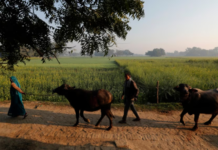
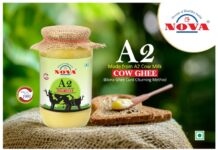


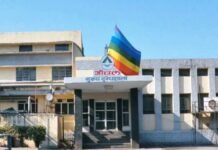

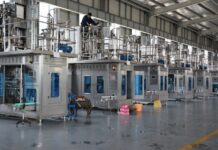




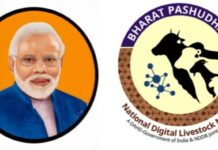



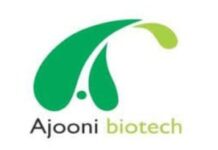
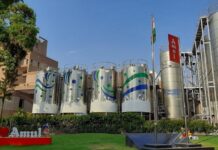









![Poolani Milk Cooperative Society [PMCS] well-established and fastest-growing in the Dairy Sectorof RuralKerala](http://thedairytimes.com/wp-content/uploads/2024/04/1-100x70.jpg)